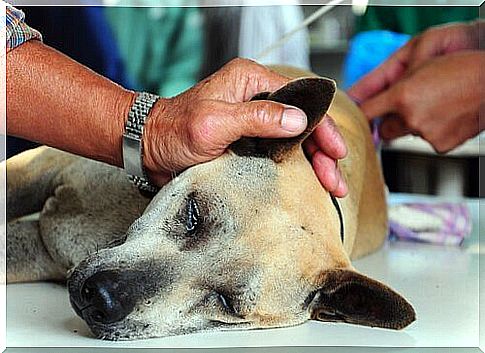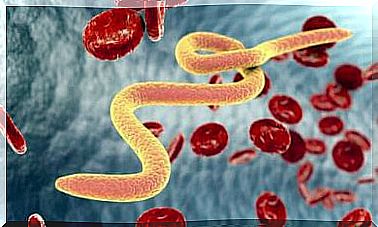Itching In Your Dog’s Ears: What Causes?

Parasites, fungus, ear infections, foreign bodies, or food allergies may be reasons for your dog to repeatedly scratch this area. Below, we will see some causes of itchy ears in dogs, which should be confirmed by the veterinarian in examinations.
There are many reasons for itchy ears in dogs. It is a very frequent and troublesome problem, and you need to find reasons to avoid complications.
Determining whether the cause is pathological is the veterinarian’s task, and it is necessary to visit him immediately. The professional has the appropriate diagnostic instrument, the otoscope, and has experience in sedating the animal, if necessary. It is not always easy to examine our pets, as some of them can be very restless.
Itchy ears: parasites
The most well-known parasites that cause the most itchy ears and skin in general are mites, fleas and ticks. They install on the skin and fur with ease and, because they are contagious, they are passed on by the contact of the animals. Parasites can also be found in the environment (earth or plants) waiting for an opportunity to infect an animal.

Unless there is a large infestation, the mentioned parasites can be eradicated quickly and safely using chemical products available on the market.
To prevent infection, there are products such as flea collars, prophylactic baths and injections that are applied periodically.

Fungi
There are thousands of fungi that can affect the skin and coat of dogs. Most of them develop in the presence of moisture and heat. However, the best known is the one that produces Dermatophytosis.
It causes burning, itchy ears, swelling, changes in skin color and shedding of hair in the affected areas. When you observe these symptoms, take your pet to the veterinarian for an accurate diagnosis and to prescribe an appropriate treatment.
Otitis and other infections
It is possible that the cause of the itchy ears is not superficial and that the dog has an acute ear infection, otitis. It is necessary to observe if, in addition to the itching, the animal has other reactions. Some dogs may shake their head, rub it on one side, lose their balance, have secretions in their ears, or have some visible inflammation.

Otitis and other infections are diseases that can lead to more serious cases. Therefore, the dog must be taken to the veterinarian quickly in order to receive the necessary antibiotics in these cases.
foreign bodies
Another cause of itchy ears in dogs is the entry of an object into the ear canal. It is not uncommon for foreign bodies such as leaves, seeds, stones, branches and other small objects to accidentally enter. Only veterinarians are able to review and remove these elements.
food allergies
The food allergies that dogs can have by consuming certain foods have different symptoms, including itching in some areas of the body, especially in the ears. From scratching so much, there can be swelling and more burning, which creates a vicious circle capable of preventing healing, whether a disorder or a symptom.

Again, it is the veterinarian’s job to determine if the reaction is a kind of pruritus and how it will be done to restore the animal’s health through the application of proper treatment.
Myths About Dog Allergies
Some myths about itchy dog ears and some diseases should be cleared up:
- The diseases mentioned in this article are not contagious to humans.
- Any dog can be infected or affected by any of these situations. They are not related to the dog’s poor hygiene, breed or provenance. Breed, crossbred and stray dogs can suffer. The only influencing factor is that the dog has been very vulnerable since a puppy.
- If there are other animals in the house, such as dogs and cats, the same curative or prophylactic measures should be taken with them, as the problems can be contagious.
- The medical treatment indicated must be followed. Remember that even if the problem has apparently disappeared, the pathogen can cause a relapse.








